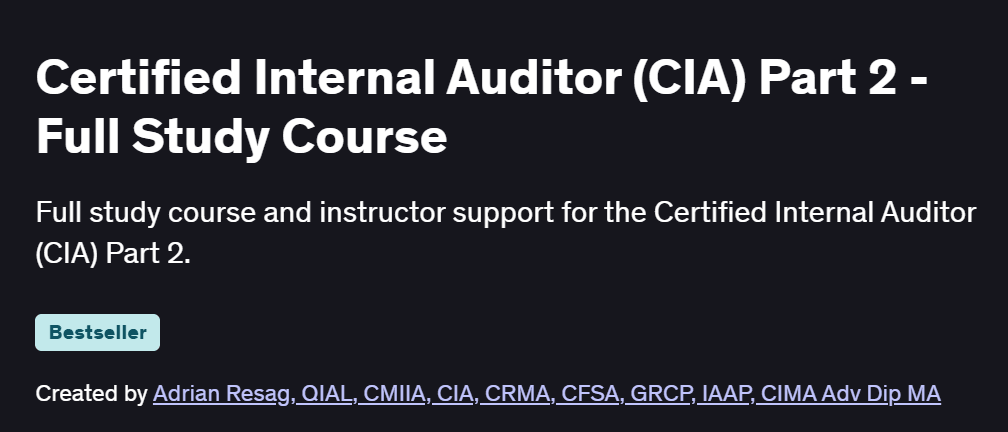What will you in Certified Internal Auditor (CIA) Part 2 – Full Study Course
- Understand the core principles and standards of internal auditing.
- Learn about governance, risk management, and control processes.
- Develop skills to evaluate and improve an organization’s risk management processes.
- Gain knowledge in conducting audits and providing recommendations for improvement.
- Prepare effectively for the CIA Part 2 examination.
Program Overview
Module 1: Introduction to Internal Auditing
⏳ 1 hour
Overview of internal auditing and its importance.
Understanding the role of internal auditors in organizations.
Familiarization with the International Professional Practices Framework (IPPF).
Module 2: Governance and Risk Management
⏳ 1.5 hours
Understanding governance structures and processes.
Risk management principles and practices.
Evaluating the effectiveness of governance and risk management processes.
Module 3: Control Processes
⏳ 1 hour
Design and implementation of control processes.
Evaluating the effectiveness of control processes.
Providing recommendations for improvement.
Module 4: Conducting Audits
⏳ 2 hours
Planning and executing audits.
Collecting and analyzing audit evidence.
Reporting audit findings and recommendations.
Module 5: Preparing for the CIA Part 2 Examination
⏳ 1.5 hours
Review of key concepts and topics.
Practice questions and case studies.
Tips and strategies for exam preparation.
Get certificate
Job Outlook
Internal auditors are in demand across various industries, including finance, healthcare, and government.
The role offers opportunities for career advancement and specialization in areas like IT auditing and forensic auditing.
According to the U.S. Bureau of Labor Statistics, the median annual wage for internal auditors was $72,520 in 2020.
Explore More Learning Paths
Expand your auditing expertise with courses designed to strengthen your knowledge of internal controls, compliance, and professional auditing standards.
Related Courses
Information Systems Auditing, Controls, and Assurance Course – Learn to assess and audit information systems, ensuring compliance, security, and operational efficiency.
Complete Health and Safety Auditor Course (OHSAS 18001) Course – Gain practical auditing skills in health and safety standards and workplace compliance.
Certified Internal Auditor (CIA) Part 2 – New Syllabus Course – Dive deeper into internal auditing principles, risk management, and governance practices for professional certification.
Related Reading
Strengthen your structured approach to organizational risk and compliance:
What Is Risk Management? – Discover how risk assessment and mitigation strategies are integral to effective auditing and organizational governance.
Specification: Certified Internal Auditor (CIA) Part 2 – Full Study Course
|
FAQs
- No, the course is designed for beginners as well as professionals.
- Prior audit knowledge can be helpful but is not required.
- The course explains governance, risk, and control concepts from scratch.
- Case studies and practice questions help bridge knowledge gaps.
- Learners from finance, accounting, or management backgrounds often adapt quickly.
- Provides a step-by-step learning path instead of scattered resources.
- Includes practice questions and case studies for applied learning.
- Breaks down complex topics into simple explanations.
- Offers lifetime access, so learners can revise anytime.
- Helps build exam strategies, not just theoretical knowledge.
- The course prepares you thoroughly but cannot guarantee passing.
- Success depends on personal effort, practice, and exam discipline.
- Supplementary question banks may further improve readiness.
- Regular revision of core concepts is critical for success.
- The certificate of completion is separate from the IIA’s CIA certification.
- Yes, internal auditors are in demand globally.
- Skills learned apply to governance, compliance, and risk roles.
- Employers value candidates with structured CIA preparation.
- Opens opportunities in IT audit, forensic audit, and consulting.
- Enhances credibility for promotions and leadership roles.
- Most learners dedicate 6–8 hours per week for steady progress.
- The course modules total around 7 hours of structured content.
- Extra practice and revision may require additional time.
- Completing in 4–6 weeks is realistic for working professionals.
- A flexible schedule is possible since access is lifetime.





